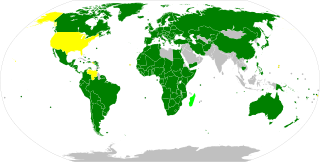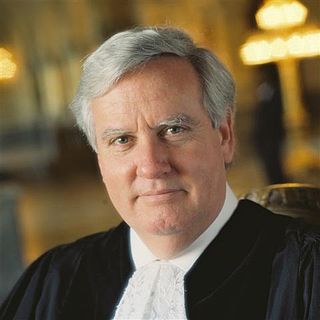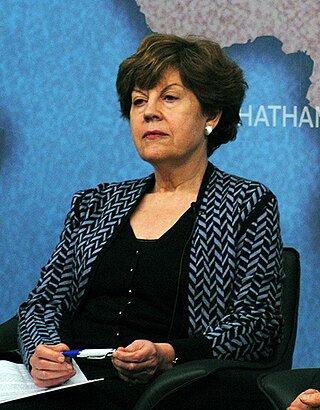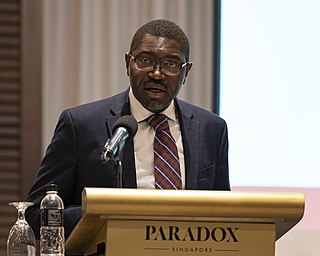Related Research Articles

The United Nations Convention on the Law of the Sea (UNCLOS), also called the Law of the Sea Convention or the Law of the Sea Treaty, is an international treaty that establishes a legal framework for all marine and maritime activities. As of July 2024, 169 States and the European Union are parties.

The Vienna Convention on Diplomatic Relations of 1961 is an international treaty that defines a framework for diplomatic relations between independent countries. Its aim is to facilitate "the development of friendly relations" among governments through a uniform set of practices and principles; most notably, it codifies the longstanding custom of diplomatic immunity, in which diplomatic missions are granted privileges that enable diplomats to perform their functions without fear of coercion or harassment by the host country. The Vienna Convention is a cornerstone of modern international relations and international law and is almost universally ratified and observed; it is considered one of the most successful legal instruments drafted under the United Nations.

The Nuremberg principles are a set of guidelines for determining what constitutes a war crime. The document was created by the International Law Commission of the United Nations to codify the legal principles underlying the Nuremberg Trials of Nazi party members following World War II.

The Vienna Convention on the Law of Treaties (VCLT) is an international agreement that regulates treaties among sovereign states.

The International Law Commission (ILC) is a body of experts responsible for helping develop and codify international law. It is composed of 34 individuals recognized for their expertise and qualifications in international law, who are elected by the United Nations General Assembly (UNGA) every five years.

The Convention Relating to the Status of Refugees, also known as the 1951 Refugee Convention or the Geneva Convention of 28 July 1951 is a United Nations multilateral treaty that defines who a refugee is and sets out the rights of individuals who are granted asylum and the responsibilities of nations that grant asylum. The convention also sets out which people do not qualify as refugees, such as war criminals. The convention also provides for some visa-free travel for holders of refugee travel documents issued under the convention.

The Vienna Convention on Consular Relations is an international treaty that defines a framework for consular relations between sovereign states. It codifies many consular practices that originated from state custom and various bilateral agreements between states.

Fausto Pocar is an Italian jurist.
The laws of state responsibility are the principles governing when and how a state is held responsible for a breach of an international obligation. Rather than set forth any particular obligations, the rules of state responsibility determine, in general, when an obligation has been breached and the legal consequences of that violation. In this way they are "secondary" rules that address basic issues of responsibility and remedies available for breach of "primary" or substantive rules of international law, such as with respect to the use of armed force. Because of this generality, the rules can be studied independently of the primary rules of obligation. They establish (1) the conditions of actions to qualify as internationally wrongful, (2) the circumstances under which actions of officials, private individuals and other entities may be attributed to the state, (3) general defences to liability and (4) the consequences of liability.

Sir Christopher John Greenwood is Master of Magdalene College, Cambridge and a former British judge at the International Court of Justice. Prior to his election, he was professor of international law at the London School of Economics and a barrister who regularly appeared as counsel before the International Court of Justice, the European Court of Human Rights, the English courts, and other tribunals.
Malcolm Nathan Shaw KC is a British legal academic, author, editor and lawyer.

Sir Nigel Simon Rodley KBE was an international lawyer and professor.

Elizabeth Susan Wilmshurst, Distinguished Fellow of the International Law Programme at Chatham House, and Professor of International Law at University College London, is best known for her role as Deputy Legal Adviser at the Foreign and Commonwealth Office of the United Kingdom on the eve of the 2003 invasion of Iraq.

The Protocol Relating to the Status of Refugees is a key treaty in international refugee law. It entered into force on 4 October 1967, and 146 countries are parties.

Jamshid Momtaz is an Iranian jurist and academic.

The legality of the Iraq War is a contested topic that spans both domestic and international law. Political leaders in the US and the UK who supported the invasion of Iraq have claimed that the war was legal. However, legal experts and other world leaders have argued that the war lacked justification and violated the United Nations charter.
Guy Serle Goodwin-Gill is a barrister and a professor of public international law at Oxford University and a Fellow of All Souls College, Oxford.
Amrith Rohan Perera, PC is a Sri Lankan lawyer and diplomat, and former Permanent Representative of Sri Lanka to the United Nations since April 2015. He was a former legal adviser to the Ministry of Foreign Affairs and Chairman of the United Nations Ad Hoc Committee on Comprehensive Convention on International Terrorism. He is a current member of the International Law Commission Perera has also served as a member of the Lessons Learnt and Reconciliation Commission and adviser to the All Party Representatives Committee.
The United Nations Audiovisual Library of International Law is a free online international law research and training tool. It was created and is maintained by the Codification Division of the United Nations Office of Legal Affairs as a part of its mandate under the United Nations Programme of Assistance in the Teaching, Study, Dissemination and Wider Appreciation of International Law.

Dapo Akande is a British-Nigerian academic and lawyer. Akande is the Chichele Professor of Public International Law at the University of Oxford, a Fellow of All Souls College, Oxford and co-director of the Oxford Institute for Ethics, Law and Armed Conflict (ELAC). Akande was the first Black professor to be honoured with a portrait at St Peter's College, Oxford. Akande is a founding editor of EJIL:Talk!, the scholarly blog of the European Journal of International Law.
References
- ↑ "Sir Michael Wood". Twenty Essex Street Chambers. Retrieved 1 September 2021.
- ↑ Townsend, Mark; Helm, Toby; Syal, Rajeev (24 January 2010). "Iraq war was illegal, top lawyer will tell Chilcot inquiry". The Guardian . Guardian News and Media . Retrieved 26 January 2010.
- ↑ "International Law Commission". legal.un.org. Retrieved 26 August 2023.
- ↑ "ODS HOME PAGE" (PDF). documents-dds-ny.un.org. Retrieved 26 August 2023.
- ↑ "Crown Office". London Gazette . Retrieved 30 March 2023.